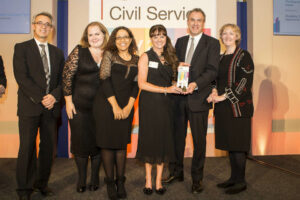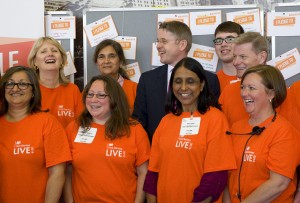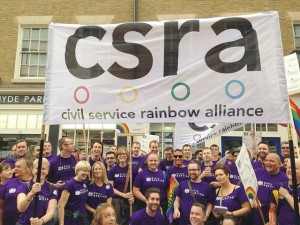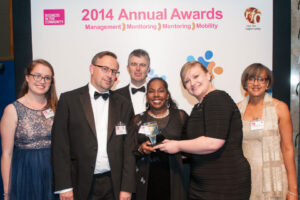
It’s been a busy 9 months since I took over as Civil Service Diversity Champion. We wrote a new Strategy, the Civil Service Talent Action Plan, launched it in September and used it to start the most concerted engagement across the Civil Service on Diversity and Inclusion that I’ve seen. Many people have been involved in this effort, and thanks to all of them!
Our Permanent Secretaries’ Champion Group (me, Sue Owen DCMS, Richard Heaton Cab Office, Sharon White HMT and Lin Homer HMRC) has been hard at work. We’ve held multiple discussions with staff networks, chaired focus groups and seminars, spoken at public events and on TV, and blogged and tweeted. We’ve also held several discussions at Permanent Secretary and DG level, including at last week’s People Board and we’re coming back to it at the Civil Service Board on 28 Jan. And, as promised, in the next weeks we’ll publish an updated Talent Action Plan.

So there’s a lot going on. I’m committed to making real progress on Diversity and Inclusion in the Civil Service. So is Jeremy Heywood, as he wrote in his blog earlier this week on priorities for 2015, and so is the Civil Service Board which has diversity as one of its top priorities. But fine words and activism alone are not the solution. We need action. Are we making real progress?
First let’s remind ourselves why this matters. There are lots of reasons. My starting point is that fairness, non-discrimination, inclusiveness and creating opportunities should be core values for public servants. Surely that’s part of our ethos and vital in the sort of workplace we want to create. And of course we should both reflect and understand all parts of the society we serve and represent.
On top of that, there is clear evidence that organisations which have an inclusive, diverse culture in which different people feel that they belong, make their own contribution, and express themselves without feeling pressured to conform to a particular stereotype are happier places to work, make better decisions and achieve the best results. McKinsey produced an interesting report on this in November.

So, are we making progress? By most standards the Civil Service is a good and fair employer. On Diversity and Inclusion we have quite a lot to be proud of. More than half of civil servants are women. We’ve made advances in flexible working including part-time and remote working, and job-sharing. Our systems of appointment, though certainly not perfect, are by most standards open and transparent (as I’ve been told by our FCO non-exec Board Members). And all members of our Civil Service Leadership group have been instructed to do Unconscious Bias training – the Permanent Secretaries have already completed face to face training.
Thank you to all who have worked hard in individual departments to create change, so many of you are making impressive progress – some examples:
- BIS has 50% women in their senior leadership
- DWP has dedicated support to help managers implement effective workplace adjustments
- HMT has 13.9% of staff working part-time, and they’ve run bespoke unconscious bias workshops
- HMRC has set up mentoring circles for underrepresented groups in London, Manchester, Glasgow, Fife and Shipley
- FCO runs a BME campaign, to improve the recruitment and internal pipeline
- Department of Health has declaration rates for 93% of their employees.
- Nearly two-thirds (62%) of Treasury Solicitor’s Department (TSoL) staff – incorporating most government legal teams – are women.

That’s all good. We should celebrate these successes, because we remain a trailblazer in some areas, as recognised by the 7 external awards we won last year. But there are also areas in which we are less successful, and seem to be falling behind others. Protected and underrepresented groups face barriers to progression and promotion. Women are underrepresented in senior grades, and the proportion of senior BME staff is shockingly low. Although not everybody declares, the same applies for LGB&T civil servants and those with disabilities.
Looking beyond the protected groups, there are serious questions about socio-economic and regional diversity in recruitment to and promotion in the Civil Service. Many people feel that the stereotype remains a white, middle class, Russell Group educated man, probably from the South-East. This is simply not the case. But we have not shifted our culture to embrace difference as much as some leading, modern private sector organisations.
Like the Hay Group’s report, published in September, on barriers to progress for women in the Civil Service, many of these points came through in the 3 further external reports we commissioned on the barriers faced by people from black and minority backgrounds, those with disabilities, and lesbian, gay, bisexual and transgender staff within the Civil Service. Many thanks to those of you who contributed!
The reports have just been completed and contain some hard hitting comments, and tough questions about our leadership culture, capability, performance management systems and accountability. But we welcome this challenge - and it is important that we have the confidence as a civil service to address these issues directly. Some of the cross-cutting themes emerging are that we need more systematic gathering of data, that people feel inhibited by a strong mono-culture at the top of the Civil Service which they feel obliged to conform to, that there is deliberate or unconscious bias in performance appraisals and that more systematic access to training and positive action schemes is necessary. We will respond to the key recommendations in the updated Talent Action Plan, and publish the reports alongside it.
So what – you may ask? The Civil Service is renowned for creating documents that sit on the shelf. I know we will be judged by results. That’s why we’ve introduced new systems and structures to drive this work forward. Permanent Secretaries are being held to account for the implementation of TAP measures in their departments. A new central Diversity Strategy Team has been established in the Cabinet Office led by Andy Heyn. The 4 Permanent Secretary Champions are working to focus efforts on gender, race, disability and LGB&T. In all this we are continuing to work with Janet Hill and her Civil Service Diversity and Inclusion team who do so much excellent work to implement diversity programmes, such as the Positive Action Pathway, Youth Internships and new initiatives such as an enhanced mentoring offer for disabled colleagues.
And will we keep this up and see it through? Well, it’s up to us, the leadership, to convince you that the answer is yes. So, for example, we’ve already tasked all Permanent Secretaries to report back on the implementation of an initial 10 recommendations of the Talent Action Plan in their departments. The results have been pulled together and Permanent Secretaries will next have to explain how they will follow up all the other recommendations.
I’m looking forward to discussing all of these points at the Civil Service Board. We’re determined to maintain a strong focus on Diversity and Inclusion. We know that we are not going to solve all the problems at once. Success will require sustained effort and patience. We’ll keep going!

18 comments
Comment by Simon posted on
The baisicPMR system as applied is flawed and can be biased against those of us who have Disabilities ..especially Mental health issues
I myself suffer from PTSD and have been managed both well and badley
as i am managed well at the moment my behaviours side is very much improoving as the stress is reduced .
However the "learning side " has lapsed ....i can cope with this as i am settled in my present position . how ever it also bars me from promotion as the markings cannot reflect the actual effort needed to be an effective team member .
So as i write this all the talent Programs are lost to me, there again they will be there and used when i am able .
Comment by Jo Liz posted on
Nice to see trans gender represented in there.. Oh wait..
Comment by Blog team posted on
Whilst Sir Simon doesn't mention transgender colleagues in his post, the transgender community is specifically highlighted in the <a href="https://www.gov.uk/government/uploads/system/uploads/attachment_data/file/418050/TAP_Template_260315.pdf">refreshed Talent Action Plan</a>, and there's a definite action to engage more fully with transgender colleagues over this year.
If you want get involved in this process please email the Diversity & Inclusion team: <a href="mailto:inclusion@cabinetoffice.gov.uk">inclusion@cabinetoffice.gov.uk</a>
Comment by Deborah Brooks posted on
Thank you everyone for your comments. I am afraid I only just saw them and that is why I didn't respond sooner. I completely agree that diversity is a complex issue and that there are many factors at play - age, education, socio-economic status, working style - these are some but there are other as well.
This is probably not the best forum for a discussion about this but please rest assured that in the Civil Service Diversity and Inclusion Team we think about all of these issues a great deal. The Talent Action Plan strives to create a Civil Service in which all people can succeed, whatever their background - therefore to be a genuinely inclusive employer.
I am happy for anyone to email me at inclusion@cabinetoffice.gov.uk if you would like to hear more detail about what we are doing or how you can get involved.
Comment by Lorraine Phillips posted on
Deborah, you quoted percentages, what are theses in numbers and how many from an African/Caribbean minority ethnic background?
Comment by Kevin posted on
Yes Gender and Sexual orientation always get the lions share of the feedback.
Its a good point on age discrimination the issue was brought up through perceived age bias against female presenters on the BBC.
How about another issue of undermentioned discriminination. Relationship Status!
Yes question What is the proportion of top civil servants who are Married/Cohabiting/Single/No Relationship status.
I know of one private sector that has a terrible record of bullying and discrimination on this issue.
Wrongly in my view their is legal protection for the status of marriage which discriminates against every other relationship status.
Diversity needs to recognise every relationship status!
Comment by Terry posted on
I note several departments above are trumpeted for having >50% female staff. I presume these departments will now be having urgent focus groups, workshops, seminars and so on to address this balance and to encourage more male members of staff to join these said departments ;-).
Comment by Ralph Cox posted on
Age is in EQA2010
Some of on this thread have commented on the risks of age discrimination. In particular, a failure to take past discriminations into account.
"Fifty-five and only on HEO?"
Comment by Charlotte posted on
Interesting to note that age has not been included in the Diversity List, as well as race, sexual orientation, disability and gender.
I am certainly notice a trend towards employing and promoting younger candidates (often with very little maturity and experience) to senior roles (Band A plus). In some cases, I've experienced and witnessed existing staff members (over a certain age) being pushed to the side or being told not to apply for role in order to implicitly express a preference for Fast-Streamer or 'apparent innovative' newcomers.
The number of mature part-time students attending University (40% of undergraduates are mature students), demonstrates that a lot of times not only do mature Civil Servants have the experience but also the up to date skill-sets and qualifications required for the job. So why move this valuable demographic aside?
In addition, the blog mentions that 50% of BIS Senior Managers are women, why only BIS? What is the rest of Government doing? Would also be good to understand what age group this 50% of Senior Female Managers are and how many have actually come up through the ranks, and got there through sheer hard works and experience, no matter what their background culture and race is.
The Civil Service is sitting on a goldmine of knowledge and experience, unfortunately more money is spent by ignoring it then investing in it!
Comment by Deborah Brooks posted on
hi - the comment I left above is slightly wrong - email address is inclusion@cabinetoffice.gov.uk
please amend before publishing. Thanks
Comment by Deborah Brooks posted on
Hi all - I, together with my job share partner Susie, am part of the team working with Simon on implementing the Talent Action Plan and improving diversity in the Civil Service. I just wanted to pick up on a point that Voice of Treason made about the fast stream because actually that is something we should be very proud of. The 2013 intake of the fast stream had 49.4% women, 13.2% BME and 8.6% disabled people joining it. Full figures are here - https://www.gov.uk/government/uploads/system/uploads/attachment_data/file/359238/Fast_stream_annual_report-2013.pdf
These are going to be some of our future leaders so I think this is really promising.
As Simon says above we will be publishing the three new reports and our response soon. We will also be holding some events around the country. I and the team are really interested in hearing people's views so please feel free to contact us via inclusion@cabinetoffice.gov.uk or me on twitter @deborahbrooksn3
Comment by The Voice of Treason posted on
Thanks Deborah. Those figures for 2013 will no doubt be great news - in about 20 years' time. In the meantime, what are the figures for the past 20 years which have given us the current crop of leaders? Is the 2013 data truly representative of a trend or is it an outlier? And, more to the point, given that studying for a degree is becoming more and more restricted to those wot can afford it (well, their Mummies and Daddies, actually), why do we still insist on the need to have a degree to be able to apply for a Fast Stream place? Why not have an open market for leadership? Or would that be a little too much for the vested interests that insist on recruiting in their own image..?
There used to be a thing called "Equal Opportunities" which didn't really mean anything beyond paying lip service to countering the blatant sexism, racism and every other -ism that prevented certain groups of people getting a job, let alone getting promotion. Now we have 'Diversity' which seems to involve ticking boxes to say "ok, at last we have this many from this group, that many from that group" and so on - ignoring the fact that everyone who comes from those groups went to the same schools and the same universities and belongs to the same clubs. And thinks the same way. We now hear about how diversity is about so much more than gender, race or what have you, no, it's also about how you think. Well, up to a point. You see, you're only allowed to think - and more importantly *talk* - in a diverse manner if you come from the same background as the people you're talking to. If you don't you either don't get listened to or you get actively silenced. Actively. There are ways, trust me.
Plus, as other contributors have already said, age is the invisible, uncomfortable, aspect of diversity that no-one cares to mention. Because the people who are in their 40s and 50s who are senior managers can't really fathom how someone of the same age hasn't followed the same career trajectory. Obviously it can't possibly be down to age discrimination. Can it..?
Comment by James posted on
Interesting and encouraging blog that was found after a visit to Cabinet Office where we sat in reception and watched mostly white men come and go. Women and the BME community seem to be restricted to reception, cleaning and security. It was a very depressing and frustrating 20 minutes.
Clearly an action plan is required, evidence based with senior leadership to tackle and drive the required changes. This includes a systemic look at recruitment and a programme of active challenge with employee and skill chain providers to tackle their challenges around diversity.
This is both an issue of the civil service but also of the institutions it works with or has a reliance on (e.g graduates) - and of course of society. The civil service has a role in all of these areas and could make a real difference to its own work and to society as a whole.
Comment by George posted on
If we only ever focus on factors of diversity based on who we are (colour, sex, race, preference) rather than how we are, we will only ever scratch the surface on diversity. We need to generate a culture in which diversity of style, approach, manner, behaviour, content, and experience is welcomed and encouraged - we might find then that we get all sorts of people coming through into leadership positions, perhaps even from different socio-economic backgrounds. By focusing on one size fits all behaviours and competencies designed by the prevailing elite for variations of themselves, are we not perpetuating a perfectly formed genteel middle-class box for ourselves - to quote Orwell - the country of long shadows on county grounds, warm beer, invincible green suburbs, dog lovers and old maids bicycling to Holy Communion through the morning mist, but without the clatter of clogs in the Lancashire mill towns, the to-and-fro of the lorries on the Great North Road, and the queues outside the Labour Exchanges?
Comment by Joann posted on
Indeed George, it's not as basic as race, sexual orientation, disability, gender, these are neat demographics for which the CS can positively discriminate and superficially appear to be improving diversity whilst not changing the organisations capability a jot.
Surely the aim with diversity is to improve the Civil Services competence and capability? This means different ways of thinking, diverse attitudes, diverse experiences, all far more subtle than the current metrics representing diversity success.
As Einstein said "we can't solve current problems by using the same thinking that created them"
Comment by Andrew posted on
George I agree whole heartedly with your comments
Comment by M Khan posted on
We have all the relevant evidence, expertise and ingredients to improve the situation. Now the civil service just has to take a small step...to change its culture!
Comment by The Voice of Treason posted on
You can't make progress without leadership and on diversity there doesn't seem to be much leadership in evidence. Leadership in the Civil Service only seems to apply when taking unpopular decisions that affect people without power or influence (aka the 'junior ranks'). Everything else is focus groups, warm, fuzzy words and fancy bits of paper.
"Protected and underrepresented groups face barriers to progression and promotion. Women are underrepresented in senior grades, and the proportion of senior BME staff is shockingly low. Although not everybody declares, the same applies for LGB&T civil servants and those with disabilities."
...And that's because of institutional discrimination that goes back decades. The Civil Service used to actively block even recruitment, let alone career progression, of such groups (the archives show pronounced efforts to do so), whilst giving priority to white, middle class Russell Group educated men from the South-East. Positive discrimination, effectively - but apparently that's only bad when it's non-white, non-middle class, non-Russell Group types benefitting from it. After all, we must maintain high standards, mustn't we..?
"Looking beyond the protected groups, there are serious questions about socio-economic and regional diversity in recruitment to and promotion in the Civil Service. Many people feel that the stereotype remains a white, middle class, Russell Group educated man, probably from the South-East. This is simply not the case."
Unless, of course you look at the evidence. Like, for instance, entrants into the Fast Stream, which hasn't been subject to a recruitment freeze these past few years. Factor in the career progression barriers facing people from 'non-traditional' backgrounds and the senior ranks in 10 - 15 years time will be back where they were decades ago. Which is how some people (who like to peddle the line that 'diversity' = 'superficiality') seem to want it. Roll on the need for "maintaining high standards"..!
It wouldn't be inaccurate to add the phrase "said the privately educated Oxbridge graduate and Knight of the Realm" to the end of each paragraph in this blog...